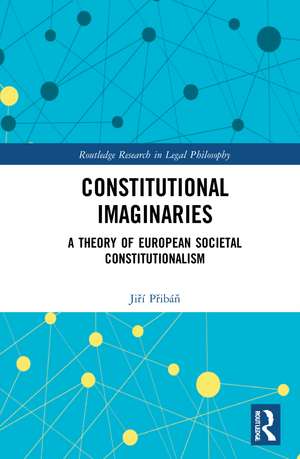Constitutional Imaginaries: A Theory of European Societal Constitutionalism: Routledge Research in Legal Philosophy
Autor Jiří Přibáňen Limba Engleză Paperback – 31 mai 2023
Constitutional imaginaries invite constitutional and political theorists, philosophers and sociologists to rethink the concept of constitution as the normative legal limitation and control of political power. They show that political constitutions include societal forces impossible to contain by legal norms and political institutions. The constitution of society as one polity defined by the unity of topos-ethnos-nomos, that is the unity of territory, people and their laws, informed the rise of modern nations and nationalisms as much as constitutional democratic statehood and its liberal and republican regimes. However, the imaginary of polity as one nation living on a given territory under the constitutional rule of law is challenged by the process of European integration and its imaginaries informed by transnational legal and societal pluralism, administrative governance, economic performativity and democratically mobilised polity. This book discusses the sociology of imagined communities and the philosophy of modern social imaginaries in the context of transnational European constitutionalism and its recent theories, most notably the theory of societal constitutions. It offers a new approach to the legal constitutions as societal power formations evolving at national, European and global levels.
The book will be of interest to scholars and students interested in constitutional and European law theory and philosophy as much as interdisciplinary and socio-legal studies of transnational law and society.
| Toate formatele și edițiile | Preț | Express |
|---|---|---|
| Paperback (1) | 389.96 lei 6-8 săpt. | |
| Taylor & Francis – 31 mai 2023 | 389.96 lei 6-8 săpt. | |
| Hardback (1) | 1003.30 lei 6-8 săpt. | |
| Taylor & Francis – 30 sep 2021 | 1003.30 lei 6-8 săpt. |
Preț: 389.96 lei
Nou
Puncte Express: 585
Preț estimativ în valută:
74.63€ • 77.63$ • 61.61£
74.63€ • 77.63$ • 61.61£
Carte tipărită la comandă
Livrare economică 15-29 aprilie
Preluare comenzi: 021 569.72.76
Specificații
ISBN-13: 9781032079639
ISBN-10: 1032079630
Pagini: 176
Dimensiuni: 156 x 234 x 14 mm
Greutate: 0.46 kg
Ediția:1
Editura: Taylor & Francis
Colecția Routledge
Seria Routledge Research in Legal Philosophy
Locul publicării:Oxford, United Kingdom
ISBN-10: 1032079630
Pagini: 176
Dimensiuni: 156 x 234 x 14 mm
Greutate: 0.46 kg
Ediția:1
Editura: Taylor & Francis
Colecția Routledge
Seria Routledge Research in Legal Philosophy
Locul publicării:Oxford, United Kingdom
Public țintă
PostgraduateCuprins
Part I: Constitutional Imaginaries and Transvaluation of Values
Chapter 1: Constitutional Imaginaries: on potentia, potestas and auctoritas
Chapter 2: Transcendental Apparatus of Constitutional Values
Part II: Out of the Topos-Ethnos-Nomos Unity
Chapter 3: Out of Topos: The Nation State Imaginary in Post-National Society
Chapter 4: Out of Ethnos: Imagined Nations and Post-National Rights Culture
Chapter 5: Out of Nomos: The Circularity of Moral Universalism and Legal Particularism
Part III: European Constitutional Imaginaries
Chapter 6: The Imaginary of Legal Pluralism
Chapter 7: The Imaginary of Administrative Calculemus
Chapter 8: The Imaginary of Prosperous Imperium
Chapter 9: The Imaginary of Mobilised Communitas
Chapter 1: Constitutional Imaginaries: on potentia, potestas and auctoritas
Chapter 2: Transcendental Apparatus of Constitutional Values
Part II: Out of the Topos-Ethnos-Nomos Unity
Chapter 3: Out of Topos: The Nation State Imaginary in Post-National Society
Chapter 4: Out of Ethnos: Imagined Nations and Post-National Rights Culture
Chapter 5: Out of Nomos: The Circularity of Moral Universalism and Legal Particularism
Part III: European Constitutional Imaginaries
Chapter 6: The Imaginary of Legal Pluralism
Chapter 7: The Imaginary of Administrative Calculemus
Chapter 8: The Imaginary of Prosperous Imperium
Chapter 9: The Imaginary of Mobilised Communitas
Notă biografică
Jiří Přibáň is Professor of Law, Cardiff University, UK. He graduated from Charles University in Prague (1989) where he was appointed professor of legal theory, philosophy and sociology in 2002. He was also visiting professor or scholar at European University Institute in Florence, New York University (Prague Office), University of California in Berkeley, University of San Francisco, University of Pretoria, The Flemish Academy in Brussels and University of New South Wales, Sydney.
Recenzii
'It is an important merit of this book to show that legal and political orders are not the resultof one or more dominating political forces, but of multiple societal forces. This holds true forthe EU legal and political order, too.'
Massimo Fichera, book review in Common Market Law Review
'Přibáň first investigates the imaginary unity of society and its legal system within the framework of the nation state and then debunks it by offering a way out of this unity of topos (space), ethnos (people), and nomos (the legal order). It is precisely the inquiry into this unity, its problems, and possible alternatives to it that constitutes the main contribution of Pribáň’s thinking as expressed in Constitutional Imaginaries.'
Lukáš Lev Červinka, book review in Journal of Law and Society
Massimo Fichera, book review in Common Market Law Review
'Přibáň first investigates the imaginary unity of society and its legal system within the framework of the nation state and then debunks it by offering a way out of this unity of topos (space), ethnos (people), and nomos (the legal order). It is precisely the inquiry into this unity, its problems, and possible alternatives to it that constitutes the main contribution of Pribáň’s thinking as expressed in Constitutional Imaginaries.'
Lukáš Lev Červinka, book review in Journal of Law and Society
Descriere
This book offers a social theoretical analysis of imaginaries as constituent social forces of positive law and politics. It will be of interest to scholars and students interested in constitutional and European law theory and philosophy as much as interdisciplinary and socio-legal studies of transnational law and society.















